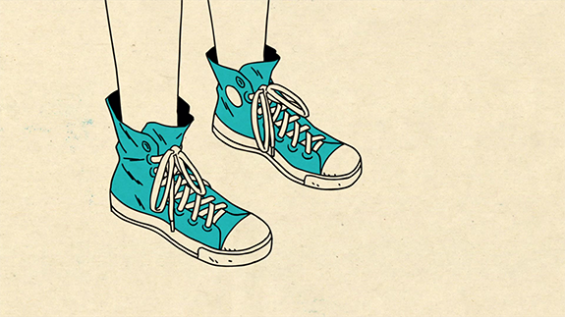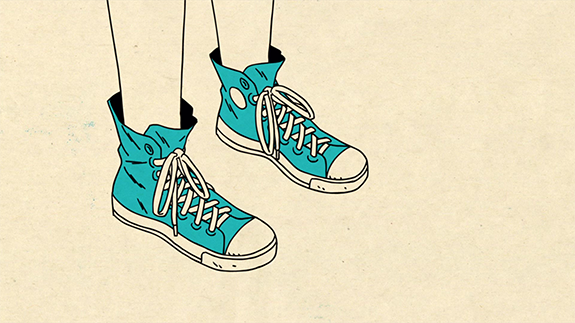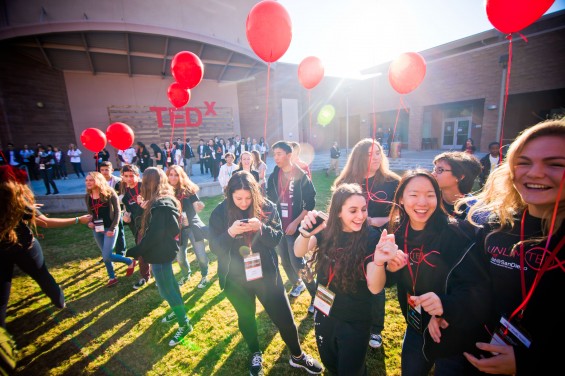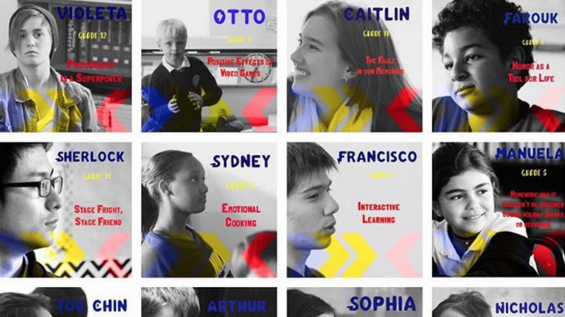
Does school prepare students for the real world? This teen speaker says no

Are teenagers today prepared for life after school? Or are American students too coddled? Windsor High School student Aliezah Hulett ponders these questions in her TED-Ed Club talk, “Preparing Students for the Real World.” During the talk, she advocates for schools to teach more real-life skills to their students, including a basic understanding of the metric system and a more realistic approach to sex education. Read on for an interview with Aliezah about the gap between what we learn in school vs. what we need in later life.
There’s a lot of discussion about modern youth being supposedly less ready for adulthood than their parents’ generation. Do you think that today’s teenagers are less prepared for the real world than ever before? If so, why?
Teenagers today are the perfect example of what can happen if parents never challenge their children to go above and beyond. They hand everything to their kids. It used to be that you’d be extremely privileged if you got to use your parents’ old beatup car once you turned sixteen. If you wanted something else, you would get a job and pay for it yourself because it was triggering a sense of responsibility. Nowadays, I see 16-year-olds with trucks and Priuses straight off the lot. This causes teenagers to be less prepared for the real world than ever before. A large chunk of this is due to parents coddling their children. According to this interesting article from The Guardian, “more than a quarter of 20 to 34 year olds are still living with their parents according to new statistics — the highest proportion since 1996.”
Do schools have a responsibility to fill in the gaps when parents don’t educate their children about basics?
The school system and parents should be working together to raise educated students. Schools should be accountable for instructing students to be knowledgeable about the world around them, even when the parents slack off. It should be a joint effort between parent and educator to train the next generation of children to be independent and prepared for what’s ahead.
Some educators might be concerned that teaching lessons around more real-world subject matter would take time away from traditional topics like calculus or Shakespeare. Do you see value in traditional topics?
Traditional topics such as calculus and Shakespeare should not be neglected, but teachers should be able to ask their class, “Now, how can we use this lesson outside of the classroom?” Every class should be able to draw out a moral that students can leave with daily. For example, a possible moral for Shakespeare’s Romeo and Juliet could be to not be swept up in emotions and carry out such rash actions.
Right now, do you think most of your peers are capable of handling life after high school and college?
If my peers were to be thrown into the real world, I don’t think that they would know how to handle themselves. There’s a sense of responsibility and maturity that come from having a job. When someone puts their head down to achieve their goals by themselves, as an independent adult, their outcome will reflect what they learned in both high school and college. These include how to sew a button or how to use a plunger!
You spoke about the need for a pragmatic approach to sex education in schools. How would you respond to those who say students shouldn’t be learning about sex at all in school?
Those who think that teenagers shouldn’t be taught about sex in school are trying to shield children from learning about the outside world. In high school, college, and the many years after, sex is a real thing. I agree that abstinence is the only way to fully prevent teen pregnancies and sexually transmitted diseases among youth, but what happens when they do decide to have sex? The answer is that they could end up getting pregnant and spreading STDs because they may not know how to properly address these types of situations. This is in no way promoting sex, but instead teaching tomorrow’s future about the truth, and what may arise in their future. By providing students with knowledge of how to properly go about the physical and mental components of sex, we are raising educated adolescents.
If you had the opportunity to design a school from the ground up, how might its classes be different from classes in existing schools?
If I got to design my own school, the classes that students would take would be based on two main components: what students are interested in, and what students will need for their lives after graduating. Sometimes, there are classes that we don’t necessarily like but are required to take because they teach things that are needed out there in the real world, or provide a better basis for the rest of a child’s learning career. However, it is proven that when a child is enjoying the class, they are more likely to absorb the information. If there is a particular subject or teaching style that a student likes, that’s information to act on.
More than 10,000 students are now sharing and presenting their ideas in TED-Ed Clubs around the world. Interested in starting a TED-Ed Club at your school? Find out more.



Yes there is no real life in education.
Nice talk! Highlights some important things we should all be learning at school.
Two questions: Why is the video “Unlisted”?Also, why are comments on YouTube disabled?
cuz haters gon hate
it is fantastic
If educators truly cared about creating students who are prepared for the real world, they would not just teach all the subjects that were pointed out in the video; they would teach more of the following: 1) how to think; ie, how to reason, how to deduce, how to consider, evaluate and conclude; how to hypothesize and evaluate hypotheses; how to test hypotheses, etc. 2) how to create and evaluate logical statements – how to identify their accuracy and veracity; 3) theory of knowledge; 4) philosophy (different thought systems and way of looking at the world and ideas).
Not the educators but the Department of Education that too often pushes a political/corporate agenda. Individualism and creative thought is too often repressed in the system we are creating.
I have been a teacher for 10 years now and I hate the path that education is traveling upon. We are no longer free to just teach. We are like robots, mirroring the corporate agendas that are ruining our school systems. The upper-level district administration is way too far removed from the classroom to know what goes on in the classroom. The teachers have to implement some pretty ridiculous classroom practices.
excellent talk, smart young lady.
I hope you grow up and become the President of the United States.
I enjoyed the talk and I thought the points were well presented. As I listened, I wondered what a parent’s role in education is. Can a parent teach how to use a plunger? Can a parent teach a child how to cook? Can a student ask at home about some of these issues? On the other hand, how many students would be engaged in a lesson about plumbing?
When I was young I knew a lot of latch key kids.I thought they were so lucky getting the house or apt. to themselves, making dinner for their mother considering most of them where from single parent familys. Kicking up their feet and watching whatever they wanted on the tele but you know I think about it now, and I remember 1 girl telling me that once she was in the apt. she was not allowed to go out til her mother got home and that wasn’t till it got dark out,I always wondered why I never saw her in the heighbourhood,she was a latch key kid. Did that prepare her for life after schooling,I don’t think so.These kids are forced to stay at home every single day of the yr. including school days off when their parents had to go to work.I got way off topic here,but these kids didn’t learn how to be independent at all,because if this is one of the ways to become independent,who wants to…
If you’re looking for a type of school that is based on what students are interested in, and what students will need for their lives after graduating. Check out the Sudbury School Model. Every student students what they want in a real life setting of democratic community.
I agree completely with this young lady and also with the one in the previous comment about teaching students, basically, how to think. I see so much of this: students not having a clue where to start something or no clue when to jump in and help, compassion, and I could go on….
As for President of the United States, yes, she could out do Donald Trump, that’s for sure.
Chalking more young adults living with their parents up to not having a real life education is lacking in real life experience. College tuition has gone up along with text books. You can’t work a summer job to pay for your college education anymore. This has also been the worst job market in recent history. After the housing collapse it’s much much harder to get a home loan, and rent in many places takes as much as two thirds of the average income of those living there. But, I can see how wanting to place the blame for lack of success solely these young adults as though they didn’t do/or weren’t taught the right things would be comforting to a high school student getting ready to face those same bleak prospects.
As for being handed things… like the mention of being given a car at 16… I have a problem with the notion you have to earn absolutely everything for yourself. Though it has be hammered into the lower and middle class that self sufficiency is everything the truth is 1) wealthy people are often started on that path by the help they receive from their wealthy parents and 2) in many ways the push to make everyone do everything on their own plays right into the over consumptive capitalism of today’s America
Not a realistic article. Seems like collection of things from here and ther!! I don’t believe getting a job at 16 to pay for things they desire only thing that teaches responsibility
- it can easily steer kids away from respecting higher Ed because once they start to make money, they may not be as interested to go to higher school, parents shall support their children and guide them to focus on achieving more -To top it off values come from family – home – and surroundings not only from school!! There’s so much competition out there than it was before for kids.
Coming back to living with parents 20-34.. I feel that’s where society is going! So nice to have kids be able to save up after college to pay off student debt while working and living at home or just save up for future!! Need to Stop considering this as a bad thing..
– parents get them off to right start for adulthood while building bond by helping with household responsibilities! When kid is mature enough to realize and be able to help around the house with big chores — sigh!!That’s real life
No drum beats needed
Oh well that’s how I raised mine and would t change a thing !!
Open to other aspects and experiences though:)
1. You are making the assumption that parents know those “real-life skills”. My parents didn’t know how to sew on a button, for example, and no one ever taught me. Confronted one day with a button that needed to be sewn on I made a horrible mess. Consequently I never tried to teach my own children how to do it because I did not know how myself. Now apply this idea to using credit responsibly, figuring out finance charges, cooking, changing the oil in a car, and other “real-life skills” and you’ll understand why my generation hasn’t taught our kids to do these things. Don’t ask the teachers, because they are my age and most of them don’t know either.
2. Your privilege is showing. At my income level and in my neighborhood we aren’t exactly bothered by sixteen-year-olds driving new Priuses straight off the lot. In my area it’s more like the sixteen-year-old is unable to get a job because his mom is working at the fast food restaurant in the evening and she needs him to babysit his younger siblings because she can’t afford to pay for childcare.
3. See number two. In my neighborhood you may find quite a few twenty or thirty somethings living with their parents. It’s not because they are spoiled. It’s because they are single parents and can’t afford a place on their own, and neither can grandma. They band together because they’re family. If they pool their income, they can afford an apartment. It won’t have enough bedrooms, because it never does, but it might be in a part of town where the neighborhood is a little safer or the schools are a little better.
Compulsory Education will NEVER teach our kids everything they need to know. Home school, or what my son likes to call “Self-directed Education” is what will give him the skills to go on after high school (or age 18) whether he decides to go to college, serve a service mission, get a full time job or start a family. Sewing on a button used to me taught in Home Ec, but today, schools are required to teach to standards that are not even 21st century. Anyone can learn how to sew on a button, or cook a meal, preserve or can food, prepare for an emergency, or even make a homemade dress via the internet as we are in an information society. But would it hurt to bring back Home Ec? Not at all. However, because of the lame standards, you will still have to learn polynomials and the difference between a metamorphic rock and a sedimentary rock. Is this really helpful to today’s students? Well I suppose if they were to go into archeology? For example, instead of my 9th grader learning Earth Science, he is learning to code in java script. Instead of reading informational texts and writing essays about whether or not the author was clear, concise, and believable, he is writing his own novel and learning what it takes to get it published. The problem today is that we let someone in DC dictate what we learn and when. But we we can let ourselves direct what we want to learn and when, that’s when REAL learning takes place and not just memorization that you will forget once the test is over.
I am a mother of four kids and I am back in school at age 43. I found this site while doing research on a paper that I am writing on this topic.
When I was in school we had classes like shop class, wood working, home economics, greenhouse, etc. I have used the skills that I learned almost my whole life. I know how to change my tires, change the oil in my car, cook, sew, put furniture together, paint, and grow my own veggie. Schools also taught a business math class that taught me how to balance my checkbook. It is so sad that kids today do not even know how to count change back because they are taught math skills today that they will NEVER use.
I helped my 10 year old with his math and his teacher marked it wrong, when I called her to ask her why she marked it wrong when they are the correct answers she said they have to mark it wrong because they are not showing their work the way they are being taught. Wait…WHAT????? They have the same answer but I showed my kid a way that he will understand and you mark it wrong because it is not the way you showed him?? Are they insane or what??? Just so sad. Well this mom has taught her boys how to work on their cars, my 6 year old cooks with me. They do chores and have manners, morals and values and I work a full time job and go to school. I would really like help through their school though. It would really be nice.
It’s a great talk, Adora, I completely agree with you. As a former college tutor, I can say that the existing education system works with a purpose to give students lots of general knowledge which future employers are hardly seeking in graduates. There are different practical courses in students’ curriculums but it’s not enough. Here is a great infographic demonstrating employability level of top US universities: https://studentshare.net/content/top-us-colleges-employability-ranking-2017.
After graduation from universities, we get the graduates with strong theoretical knowledge but without a clue how to apply it in real life. Therefore, former students have to take various practical courses, which cost a lot of money. From this situation, suffer everybody: graduates’ parents, college tutors and students themselves.
Life skills in high school’s could benefit a persons future once they graduate. High schools focus on many academic classes, which are important but what happens once they graduate? Teenagers are plunged into an adult world where accounting, banking, career searching and social events surround them everyday. So why aren’t teenagers given the opportunity to learn these skills while they’re in school? Many people think that it is the parents responsibilities, but with their jobs, parents don’t usually have the time to teach their children these important skills. Instead of replacing the school curriculum, incorporating these life skills into classes is a simple and easy change that could change students life. For example classes like math could include accounting or banking tips. There are many skills people are taught throughout their life and if those skills were taught in schools while they are free, teenagers may be more confident in their adult life.